Unit 7 Will people have robots_ (Period 2) Section A (Grammar Focus 3a-3c)教学课件(共25张PPT) 2023-2024学年人
文档属性
| 名称 | Unit 7 Will people have robots_ (Period 2) Section A (Grammar Focus 3a-3c)教学课件(共25张PPT) 2023-2024学年人 | 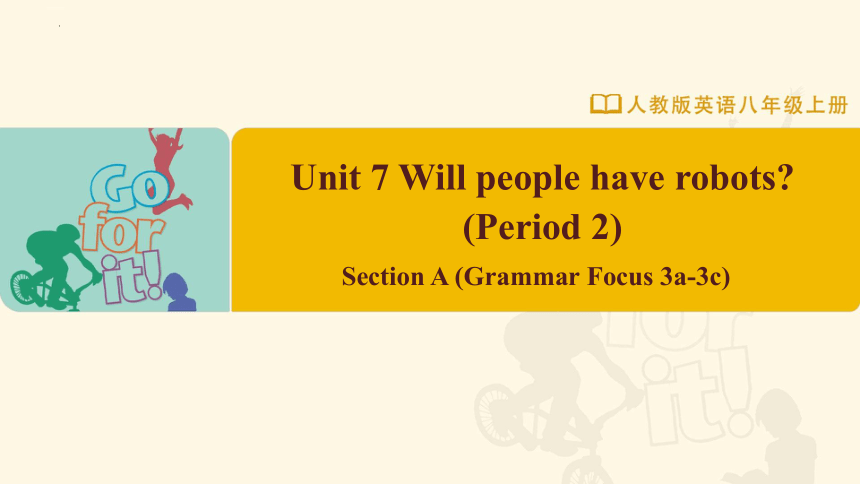 | |
| 格式 | pptx | ||
| 文件大小 | 2.2MB | ||
| 资源类型 | 教案 | ||
| 版本资源 | 人教新目标(Go for it)版 | ||
| 科目 | 英语 | ||
| 更新时间 | 2023-10-02 19:26:41 | ||
图片预览

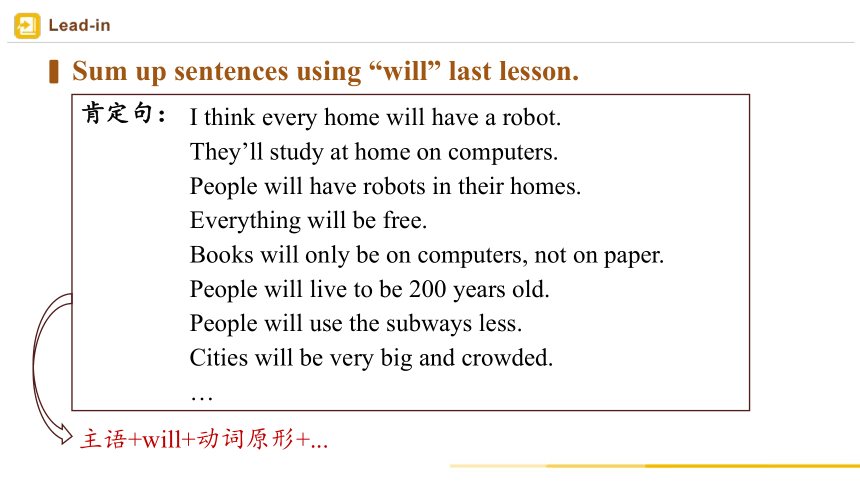
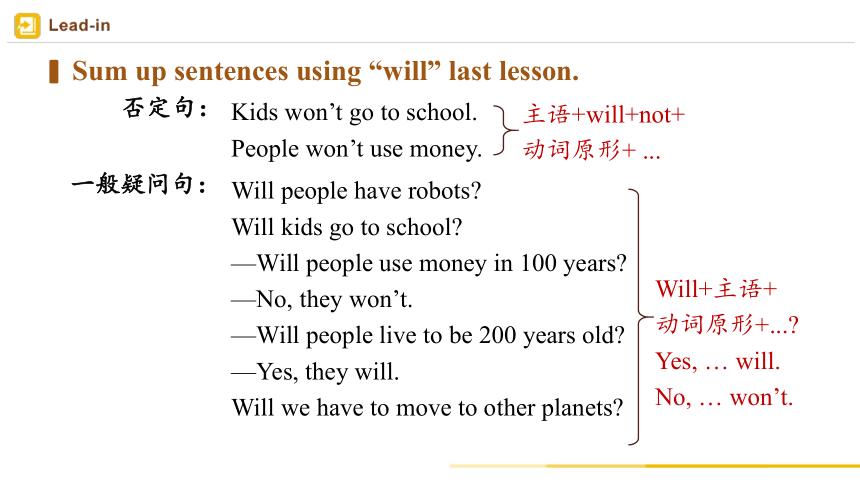
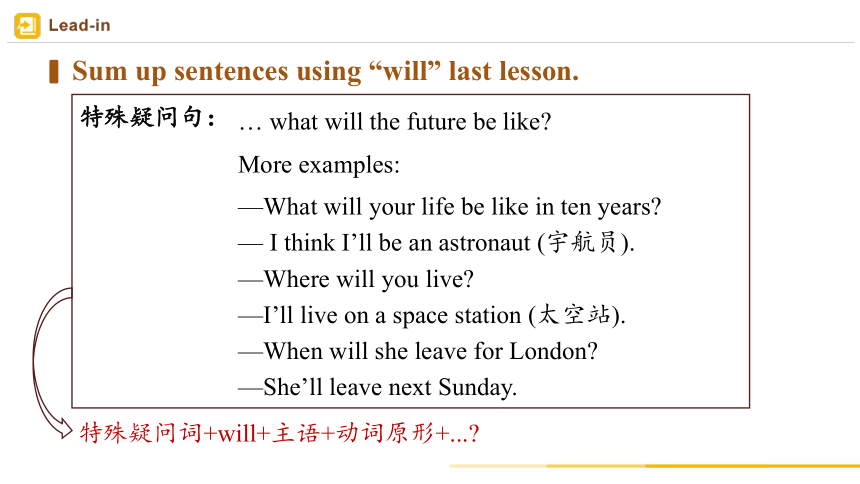
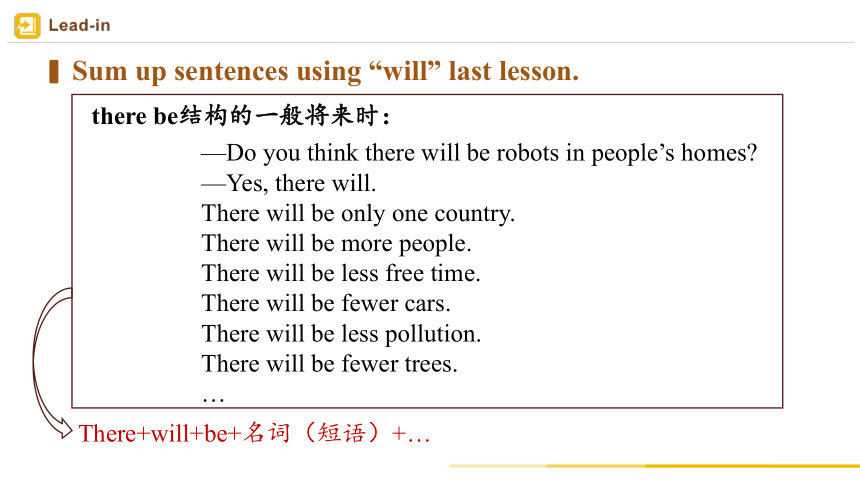
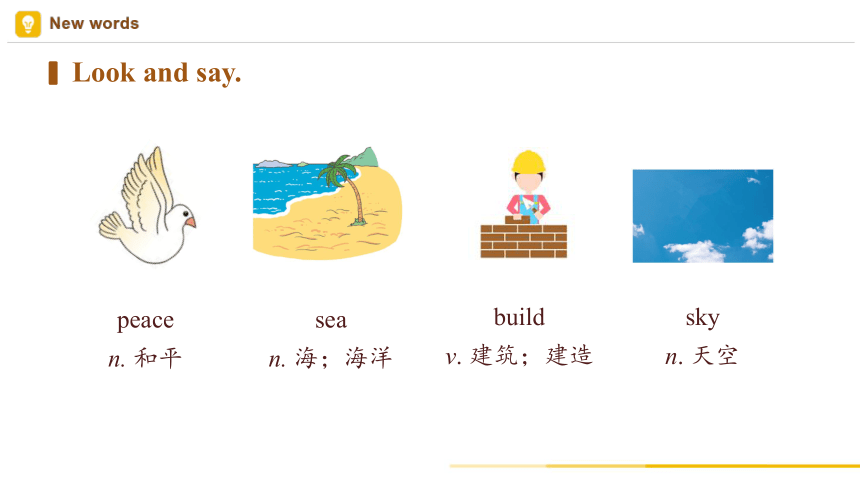

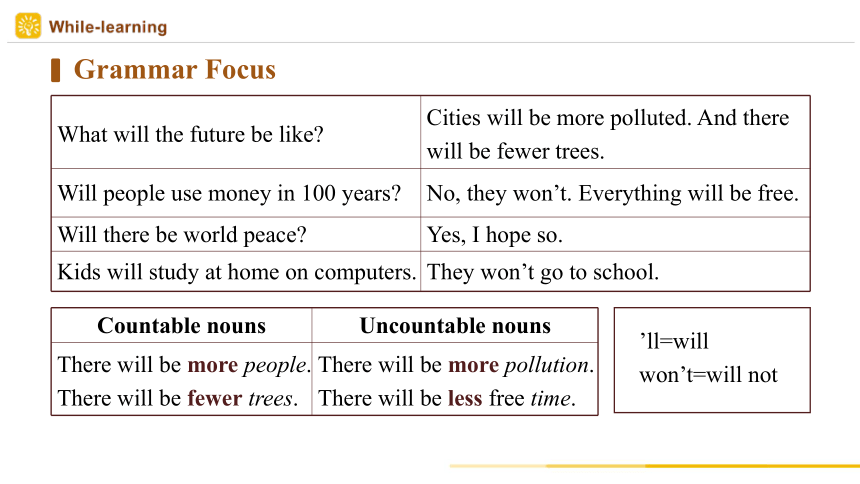
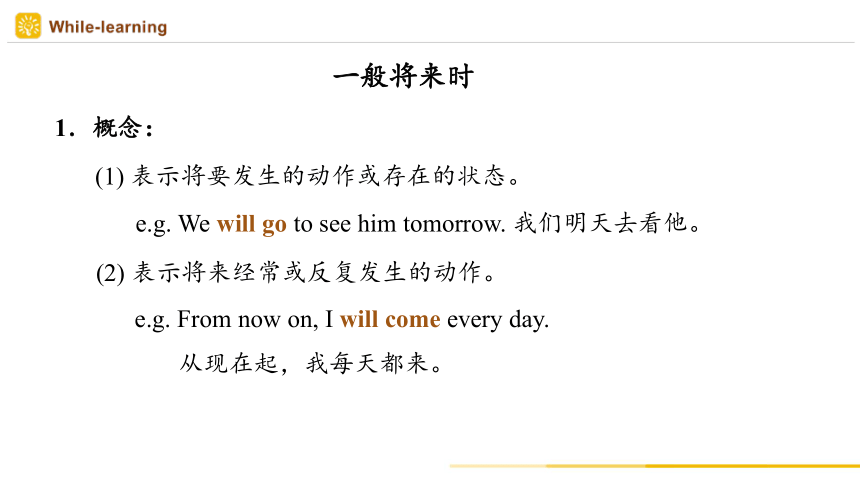
文档简介
(共25张PPT)
Unit 7 Will people have robots
(Period 2)
Section A (Grammar Focus 3a-3c)
I think every home will have a robot.
They’ll study at home on computers.
People will have robots in their homes.
Everything will be free.
Books will only be on computers, not on paper.
People will live to be 200 years old.
People will use the subways less.
Cities will be very big and crowded.
…
Sum up sentences using “will” last lesson.
肯定句:
主语+will+动词原形+...
Kids won’t go to school.
People won’t use money.
Sum up sentences using “will” last lesson.
否定句:
一般疑问句:
Will people have robots
Will kids go to school
—Will people use money in 100 years
—No, they won’t.
—Will people live to be 200 years old
—Yes, they will.
Will we have to move to other planets
主语+will+not+
动词原形+ ...
Will+主语+
动词原形+...
Yes, … will.
No, … won’t.
Sum up sentences using “will” last lesson.
特殊疑问句:
… what will the future be like
—What will your life be like in ten years
— I think I’ll be an astronaut (宇航员).
—Where will you live
—I’ll live on a space station (太空站).
—When will she leave for London
—She’ll leave next Sunday.
More examples:
特殊疑问词+will+主语+动词原形+...
—Do you think there will be robots in people’s homes
—Yes, there will.
There will be only one country.
There will be more people.
There will be less free time.
There will be fewer cars.
There will be less pollution.
There will be fewer trees.
…
Sum up sentences using “will” last lesson.
there be结构的一般将来时:
There+will+be+名词(短语)+…
peace
n. 和平
sea
n. 海;海洋
build
v. 建筑;建造
sky
n. 天空
Look and say.
Fill in the table.
原级 最高级 用法
more ___________ _________ 后接_____________名词
less ___________ _________ 后接_____________名词
fewer ___________ _________ 后接_____________名词
much/many
little
few
most
least
fewest
可数或不可数
不可数
可数
Grammar Focus
What will the future be like Cities will be more polluted. And there will be fewer trees.
Will people use money in 100 years No, they won’t. Everything will be free.
Will there be world peace Yes, I hope so.
Kids will study at home on computers. They won’t go to school.
Countable nouns Uncountable nouns
There will be more people. There will be fewer trees. There will be more pollution.
There will be less free time.
’ll=will
won’t=will not
1.概念:
(1) 表示将要发生的动作或存在的状态。
e.g. We will go to see him tomorrow. 我们明天去看他。
(2) 表示将来经常或反复发生的动作。
e.g. From now on, I will come every day.
从现在起,我每天都来。
一般将来时
肯定句:主语+will+动词原形.
2.基本句型:
否定句:主语+will+not+动词原形.
一般疑问句:Will+语+动词原形
特殊疑问句:特殊疑问词+一般疑问句
简略回答:Yes, … will.
No, … won’t. (注意缩写形式)
一般将来时
3.时间状语:
(1) next 类:next week, next month, next year 等
e.g. We’ll make a model plane next week.
下周我们将制作一个飞机模型。
(2) tomorrow 类:tomorrow, tomorrow morning, tomorrow afternoon,
the day after tomorrow 等
e.g. What will you do tomorrow afternoon
明天下午你将做什么?
一般将来时
(3) 其他:in a/two/three … day(s)/week(s) …、in the future 等
e.g. Jim will be back in two days. 吉姆将在两天后回来。
3.时间状语:
(4) 无时间状语:有些句子没有明显的表示将来的时间状语,
但是根据上下文语境可以判断出事情发生在将来,这种情
况下也要使用一般将来时。
e.g. We have no more vegetables in the fridge. I will go and
buy some. 我们冰箱里没有蔬菜了,我会去买一些。
一般将来时
—Did you call Jenny
—Oh no, I forgot. I ________ her right away.
A.called B.have called C.call D.will call
可用关键词法和语法判断法解答本题。句意:“你打电话给珍妮了吗 ”“哦,没有,我忘记了。我立刻打给她。”由 forgot 和 right away 可知电话还没打,所以用一般将来时。故选D。
D
典例
点拨
一般将来时
4.be going to 与 will 的区别:
be going to 表示将来时常与will互换使用,但它侧重于强调将要发生的动作或安排,特别是打算、计划、决定要做的事。will 则常用来客观陈述将来某个时间要发生的动作或存在的状态。
e.g. I’m going to watch that football match this evening.
今天晚上我打算看那场足球赛。
There will be a match this evening. 今天晚上将有一场比赛。
一般将来时
(1) 表示按规定、计划或时刻表等将要进行的动作,但限于少数
动词,如 start、come、leave、arrive 等。
5.一般现在时表示将来的情况:
e.g. The new term starts on September 1st.
新学期将于9月1日开始。
(2) 在时间或条件状语从句中,用一般现在时表将来。
e.g. We will go hiking if it doesn’t rain tomorrow.
如果明天不下雨,我们将去远足。
一般将来时
It will be hard for us to get up in the morning if we ________ to bed too late.
A.go B.went C.will go D.have gone
可用语境分析法和关键词法解答本题。句意:如果我们很晚才上床睡觉,那么早上起床对于我们来说将会很困难。条件状语从句中用一般现在时表示将来,由 if 和语境可知答案。故选A。
A
典例
点拨
一般将来时
3a
Fill in the blanks with more, less or fewer.
1.In the future, there will be _______ fresh water because there will
be _____ pollution in the sea.
2.In 100 years, there will be _______ cars because there will be
_______ people in the cities.
3.There will be ______ jobs for people because ________ robots
will do the same jobs as people.
4.I think there will be ________ cities because people will build
______ buildings in the country.
5.In 50 years, people will have ______ free time because there will
be ______ things to do.
more
less
more
more
more
fewer
more
fewer
more
fewer
3b
Complete the predictions with what you think will happen.
1.Kids study at school now. In 100 years, _______________________
_______________________________________________________
2.I sometimes see blue skies in my cities, but in the future __________
_______________________________________________________
3.People now usually live to be about 70-80 years old, but in the future
_______________________________________________________
4.Families usually spend time together on weekends, but maybe in 200
years ___________________________________________________
they will study at home
I will
people will live to be 200 years old.
families will spend time together every day.
on computers.
almost see the blue skies every day.
Sum up adverbials of time (时间状语) and frequency adverbs (频度副词) in 3b.
adverbials of time
now
on weekends
in 100 years
in the future
in 200 years
frequency adverbs
sometimes
usually
一般现在时
一般将来时
3c
Draw a picture of what you think a city in the future will be like. Then describe it to the class.
Think and draw:
Will there be more pollution
Will the air be cleaner
Will there be more animals in the zoo
Will our city become more crowded
Will more people drive their cars to work
3c
Draw a picture of what you think a city in the future will be like. Then describe it to the class.
You can describe like this:
This is our city in 50 years. I think there will be more tall buildings, and there will be fewer cars and more buses.
一般将来时
1.概念:
(1) 表示将要发生的动作或存在的状态。
(2) 表示将来经常或反复发生的动作。
肯定句:主语+will+动词原形.
2.基本句型:
否定句:主语+will+not+动词原形.
一般疑问句:Will+主语+动词原形
特殊疑问句:特殊疑问词+一般疑问句
简略回答:Yes, … will./No, … won’t.
一般将来时
3.时间状语:
next 类、tomorrow 类、其他、无时间状语
4.be going to 与 will 的区别:
be going to 侧重于主观打算、计划、决定;will 侧重客观陈述。
5.一般现在时表示将来的情况:
(1) 表示按规定、计划或时刻表等将要进行的动作。
(2) 在时间或条件状语从句中。
Remember the grammar points we’ve learnt today.
Finish the picture and description in 3c.
Unit 7 Will people have robots
(Period 2)
Section A (Grammar Focus 3a-3c)
I think every home will have a robot.
They’ll study at home on computers.
People will have robots in their homes.
Everything will be free.
Books will only be on computers, not on paper.
People will live to be 200 years old.
People will use the subways less.
Cities will be very big and crowded.
…
Sum up sentences using “will” last lesson.
肯定句:
主语+will+动词原形+...
Kids won’t go to school.
People won’t use money.
Sum up sentences using “will” last lesson.
否定句:
一般疑问句:
Will people have robots
Will kids go to school
—Will people use money in 100 years
—No, they won’t.
—Will people live to be 200 years old
—Yes, they will.
Will we have to move to other planets
主语+will+not+
动词原形+ ...
Will+主语+
动词原形+...
Yes, … will.
No, … won’t.
Sum up sentences using “will” last lesson.
特殊疑问句:
… what will the future be like
—What will your life be like in ten years
— I think I’ll be an astronaut (宇航员).
—Where will you live
—I’ll live on a space station (太空站).
—When will she leave for London
—She’ll leave next Sunday.
More examples:
特殊疑问词+will+主语+动词原形+...
—Do you think there will be robots in people’s homes
—Yes, there will.
There will be only one country.
There will be more people.
There will be less free time.
There will be fewer cars.
There will be less pollution.
There will be fewer trees.
…
Sum up sentences using “will” last lesson.
there be结构的一般将来时:
There+will+be+名词(短语)+…
peace
n. 和平
sea
n. 海;海洋
build
v. 建筑;建造
sky
n. 天空
Look and say.
Fill in the table.
原级 最高级 用法
more ___________ _________ 后接_____________名词
less ___________ _________ 后接_____________名词
fewer ___________ _________ 后接_____________名词
much/many
little
few
most
least
fewest
可数或不可数
不可数
可数
Grammar Focus
What will the future be like Cities will be more polluted. And there will be fewer trees.
Will people use money in 100 years No, they won’t. Everything will be free.
Will there be world peace Yes, I hope so.
Kids will study at home on computers. They won’t go to school.
Countable nouns Uncountable nouns
There will be more people. There will be fewer trees. There will be more pollution.
There will be less free time.
’ll=will
won’t=will not
1.概念:
(1) 表示将要发生的动作或存在的状态。
e.g. We will go to see him tomorrow. 我们明天去看他。
(2) 表示将来经常或反复发生的动作。
e.g. From now on, I will come every day.
从现在起,我每天都来。
一般将来时
肯定句:主语+will+动词原形.
2.基本句型:
否定句:主语+will+not+动词原形.
一般疑问句:Will+语+动词原形
特殊疑问句:特殊疑问词+一般疑问句
简略回答:Yes, … will.
No, … won’t. (注意缩写形式)
一般将来时
3.时间状语:
(1) next 类:next week, next month, next year 等
e.g. We’ll make a model plane next week.
下周我们将制作一个飞机模型。
(2) tomorrow 类:tomorrow, tomorrow morning, tomorrow afternoon,
the day after tomorrow 等
e.g. What will you do tomorrow afternoon
明天下午你将做什么?
一般将来时
(3) 其他:in a/two/three … day(s)/week(s) …、in the future 等
e.g. Jim will be back in two days. 吉姆将在两天后回来。
3.时间状语:
(4) 无时间状语:有些句子没有明显的表示将来的时间状语,
但是根据上下文语境可以判断出事情发生在将来,这种情
况下也要使用一般将来时。
e.g. We have no more vegetables in the fridge. I will go and
buy some. 我们冰箱里没有蔬菜了,我会去买一些。
一般将来时
—Did you call Jenny
—Oh no, I forgot. I ________ her right away.
A.called B.have called C.call D.will call
可用关键词法和语法判断法解答本题。句意:“你打电话给珍妮了吗 ”“哦,没有,我忘记了。我立刻打给她。”由 forgot 和 right away 可知电话还没打,所以用一般将来时。故选D。
D
典例
点拨
一般将来时
4.be going to 与 will 的区别:
be going to 表示将来时常与will互换使用,但它侧重于强调将要发生的动作或安排,特别是打算、计划、决定要做的事。will 则常用来客观陈述将来某个时间要发生的动作或存在的状态。
e.g. I’m going to watch that football match this evening.
今天晚上我打算看那场足球赛。
There will be a match this evening. 今天晚上将有一场比赛。
一般将来时
(1) 表示按规定、计划或时刻表等将要进行的动作,但限于少数
动词,如 start、come、leave、arrive 等。
5.一般现在时表示将来的情况:
e.g. The new term starts on September 1st.
新学期将于9月1日开始。
(2) 在时间或条件状语从句中,用一般现在时表将来。
e.g. We will go hiking if it doesn’t rain tomorrow.
如果明天不下雨,我们将去远足。
一般将来时
It will be hard for us to get up in the morning if we ________ to bed too late.
A.go B.went C.will go D.have gone
可用语境分析法和关键词法解答本题。句意:如果我们很晚才上床睡觉,那么早上起床对于我们来说将会很困难。条件状语从句中用一般现在时表示将来,由 if 和语境可知答案。故选A。
A
典例
点拨
一般将来时
3a
Fill in the blanks with more, less or fewer.
1.In the future, there will be _______ fresh water because there will
be _____ pollution in the sea.
2.In 100 years, there will be _______ cars because there will be
_______ people in the cities.
3.There will be ______ jobs for people because ________ robots
will do the same jobs as people.
4.I think there will be ________ cities because people will build
______ buildings in the country.
5.In 50 years, people will have ______ free time because there will
be ______ things to do.
more
less
more
more
more
fewer
more
fewer
more
fewer
3b
Complete the predictions with what you think will happen.
1.Kids study at school now. In 100 years, _______________________
_______________________________________________________
2.I sometimes see blue skies in my cities, but in the future __________
_______________________________________________________
3.People now usually live to be about 70-80 years old, but in the future
_______________________________________________________
4.Families usually spend time together on weekends, but maybe in 200
years ___________________________________________________
they will study at home
I will
people will live to be 200 years old.
families will spend time together every day.
on computers.
almost see the blue skies every day.
Sum up adverbials of time (时间状语) and frequency adverbs (频度副词) in 3b.
adverbials of time
now
on weekends
in 100 years
in the future
in 200 years
frequency adverbs
sometimes
usually
一般现在时
一般将来时
3c
Draw a picture of what you think a city in the future will be like. Then describe it to the class.
Think and draw:
Will there be more pollution
Will the air be cleaner
Will there be more animals in the zoo
Will our city become more crowded
Will more people drive their cars to work
3c
Draw a picture of what you think a city in the future will be like. Then describe it to the class.
You can describe like this:
This is our city in 50 years. I think there will be more tall buildings, and there will be fewer cars and more buses.
一般将来时
1.概念:
(1) 表示将要发生的动作或存在的状态。
(2) 表示将来经常或反复发生的动作。
肯定句:主语+will+动词原形.
2.基本句型:
否定句:主语+will+not+动词原形.
一般疑问句:Will+主语+动词原形
特殊疑问句:特殊疑问词+一般疑问句
简略回答:Yes, … will./No, … won’t.
一般将来时
3.时间状语:
next 类、tomorrow 类、其他、无时间状语
4.be going to 与 will 的区别:
be going to 侧重于主观打算、计划、决定;will 侧重客观陈述。
5.一般现在时表示将来的情况:
(1) 表示按规定、计划或时刻表等将要进行的动作。
(2) 在时间或条件状语从句中。
Remember the grammar points we’ve learnt today.
Finish the picture and description in 3c.
同课章节目录
- Unit 1 Where did you go on vacation?
- Section A
- Section B
- Unit 2 How often do you exercise?
- Section A
- Section B
- Unit 3 I'm more outgoing than my sister.
- Section A
- Section B
- Unit 4 What's the best movie theater?
- Section A
- Section B
- Unit 5 Do you want to watch a game show?
- Section A
- Section B
- Unit 6 I'm going to study computer science.
- Section A
- Section B
- Unit 7 Will people have robots?
- Section A
- Section B
- Unit 8 How do you make a banana milk shake?
- Section A
- Section B
- Unit 9 Can you come to my party?
- Section A
- Section B
- Unit 10 If you go to the party, you'll have a grea
- Section A
- Section B
